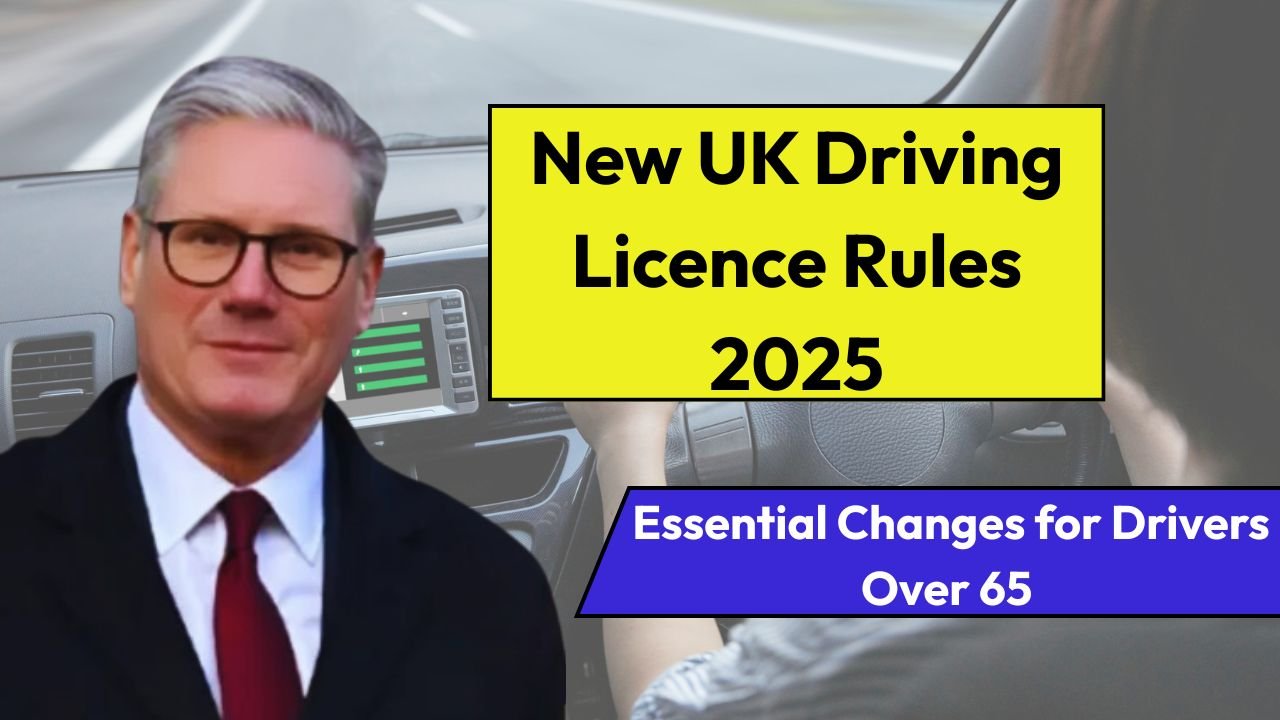The UK is rolling out major updates to driving licence rules in 2025, targeting drivers aged 65 and older. These changes aim to boost road safety while supporting senior drivers’ independence. From stricter medical checks to a new digital renewal system, here’s everything you need to know to stay compliant and safe on the road.
Why Are Driving Rules Changing for Over-65s?
The UK’s ageing population is driving longer, with over 6 million drivers aged 70 and above. New rules starting in July 2025 focus on ensuring seniors are fit to drive. The DVLA wants to reduce risks from age-related health issues without limiting mobility.
Road Safety Concerns
Ageing can affect vision, reaction times, and cognitive abilities. Recent data shows older drivers are involved in fewer accidents, but health-related crashes are a concern. The 2025 reforms aim to catch issues early.
Balancing Independence and Safety
The DVLA’s goal is clear: keep roads safe while allowing seniors to drive confidently. These changes are not about taking away licences but ensuring drivers meet safety standards.
Key Changes to UK Driving Licence Rules in 2025
From July 2025, drivers over 65 will face new requirements. Here’s a breakdown of what’s changing and how it affects you.
Lower Renewal Age and Frequency
The renewal age for driving licences is dropping from 70 to 65. Drivers will need to renew their licence every three years starting at 65. This ensures regular health checks without overwhelming seniors.
Mandatory Medical and Vision Assessments
Seniors must provide proof of good health and eyesight during renewals. This includes:
- Eye tests: Confirming you can read a number plate from 20 metres.
- Medical reports: A GP-signed form verifying fitness to drive.
- Cognitive checks: For high-risk cases, like those with dementia or recent strokes.
Digital-First Renewal Process
The DVLA is launching an online portal for licence renewals. You can upload medical records, book eye tests, and track applications. Postal options remain, but digital is faster and encouraged.
Random DVLA Spot Checks
The DVLA may conduct random health screenings for drivers over 65. This ensures ongoing compliance, even between renewals. Non-compliance could lead to licence restrictions or revocation.
| Requirement | Pre-2025 | Post-July 2025 |
|---|---|---|
| Renewal Age | 70 | 65 |
| Renewal Interval | Every 3 years (from 70) | Every 3 years (from 65) |
| Medical Declaration | Self-declared | GP-signed medical form required |
| Vision Tests | Rarely required | Mandatory for all renewals |
| DVLA Screening | Reactive (after issues reported) | Proactive random checks |
How These Changes Affect Insurance Costs
The new rules could impact car insurance for seniors. Insurers assess risk based on age, health, and driving history. Here’s what to expect.
Potential Premium Increases
If medical checks reveal conditions like poor vision, premiums may rise. Insurers may see these drivers as higher risk. Compare quotes from multiple providers to find affordable options.
Discounts for Safe Drivers
Seniors with clean records and passing health checks could qualify for discounts. Some insurers offer “senior driver” policies with benefits like lower rates for daytime-only driving.
Tips to Save on Insurance
- Shop around: Use comparison sites like CompareTheMarket or MoneySuperMarket.
- Consider telematics: A black-box device can prove safe driving habits.
- Limit mileage: Lower annual mileage often reduces premiums.
Penalties for Ignoring the New Rules
Failing to comply with the 2025 rules can lead to serious consequences. Here’s what’s at stake.
Fines and Points
Driving with an expired or invalid licence could result in a £1,000 fine. You may also receive penalty points, increasing insurance costs.
Insurance Invalidation
Driving without passing required health checks could void your insurance. This means you’d pay out-of-pocket for accident damages or injuries.
Prosecution Risks
In severe cases, non-compliance could lead to prosecution, especially if an accident occurs. Stay proactive to avoid legal trouble.
How to Prepare for the 2025 Changes
Getting ready now will make the transition smoother. Follow these steps to stay ahead.
Schedule Health and Vision Checks
Book an eye test and GP visit well before your renewal date. Keep records updated for conditions like diabetes or heart issues.
Learn the Digital Renewal System
Familiarise yourself with the DVLA’s online portal. If tech isn’t your strength, ask family or visit a local DVLA support centre for help.
Plan for Insurance Adjustments
Start comparing insurance policies early. Look for providers offering senior-friendly plans. Budget for potential premium changes.
Explore Transport Alternatives
If driving becomes challenging, consider options like:
- Public transport with senior discounts.
- Community ride-share programs.
- Family or caregiver support for errands.
Public Reactions to the 2025 Reforms
The changes have sparked lively debate across the UK. Here’s a look at both sides.
Support from Safety Advocates
Road safety groups like Brake applaud the reforms. They argue that regular health checks will reduce accidents and save lives. Data shows vision-related crashes drop with stricter testing.
Concerns from Senior Drivers
Some seniors worry about added costs and bureaucracy. Rural drivers, with limited transport options, fear losing independence. Critics also point to past DVLA backlogs, which could delay renewals.
Government Response
The government promises support, including helplines and in-person assistance. Awareness campaigns will launch in early 2025 to guide seniors through the process.
FAQs About UK Driving Licence Rules 2025
1. When do the new driving licence rules start?
The rules take effect from July 2025. Drivers aged 65 and over must renew every three years with medical and vision checks.
2. Do I need to take a driving test at 65?
No, a full driving test isn’t required. However, you must pass medical and vision assessments to renew your licence.
3. Can I still renew my licence by post?
Yes, postal renewals are still available. However, the DVLA encourages using the faster online portal for efficiency.
4. What happens if I fail the medical or vision test?
If you fail, the DVLA may impose restrictions (e.g., daytime-only driving) or revoke your licence. You can appeal decisions through the DVLA.
5. Will my insurance go up because of these changes?
It depends. Passing health checks could lower premiums, but flagged conditions might increase costs. Compare quotes to find the best deal.
Conclusion: Stay Informed and Ready
The 2025 UK driving licence rules for over-65s are a major shift, balancing safety with independence. By preparing early—scheduling health checks, learning the digital system, and reviewing insurance—you can avoid fines and stay on the road. Don’t wait until the last minute. Take action now to ensure a smooth transition and keep driving confidently. Have questions? Visit the DVLA website or contact their helpline for guidance.





Shouldn’t EVERYONE have an eye test.? Why only older people? Isn’t this age discrimination?